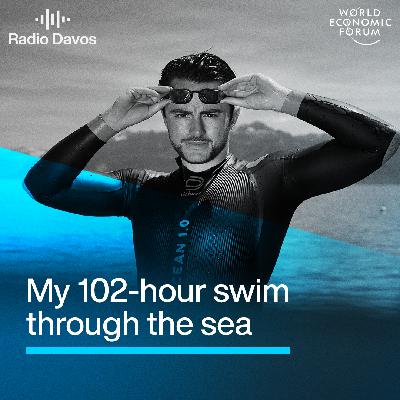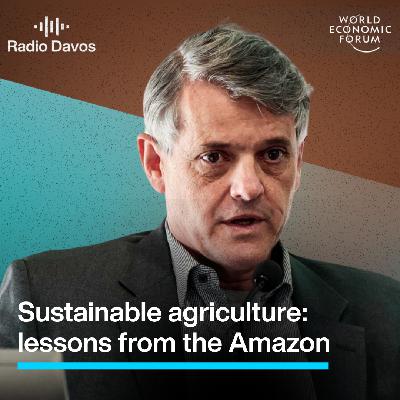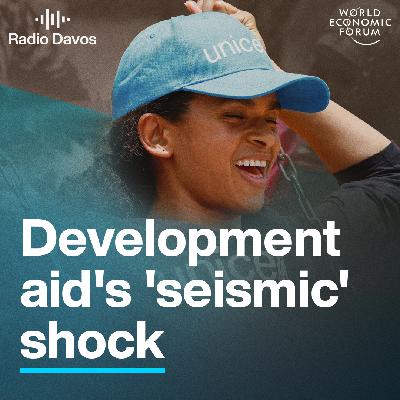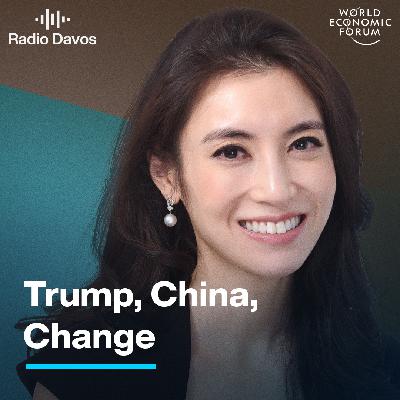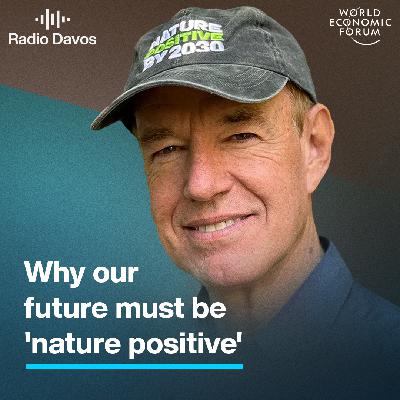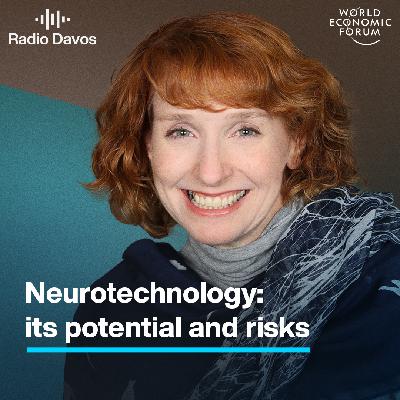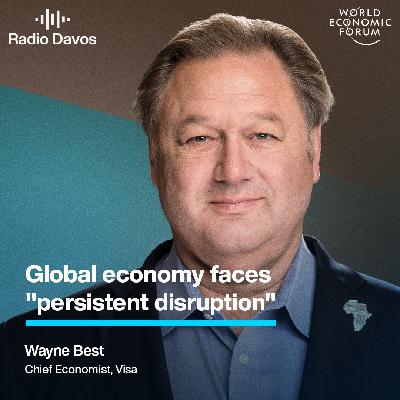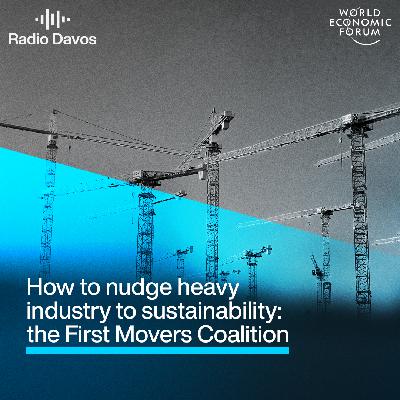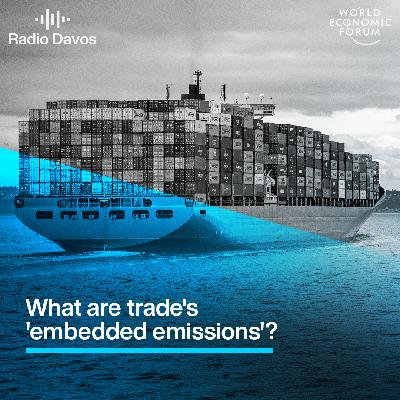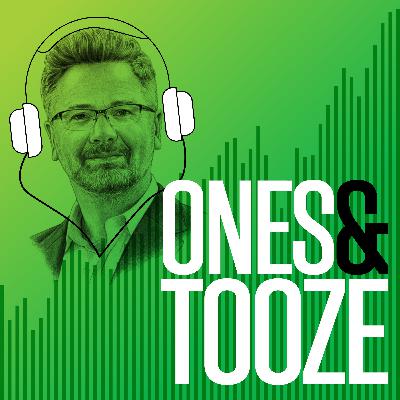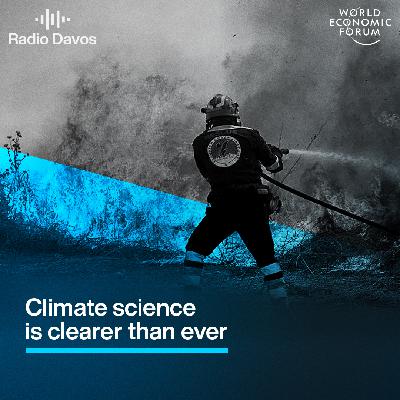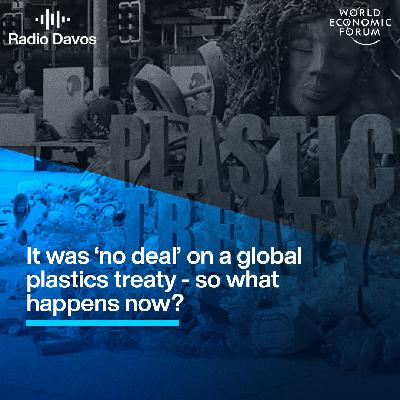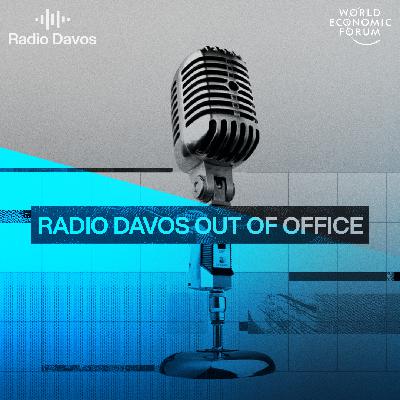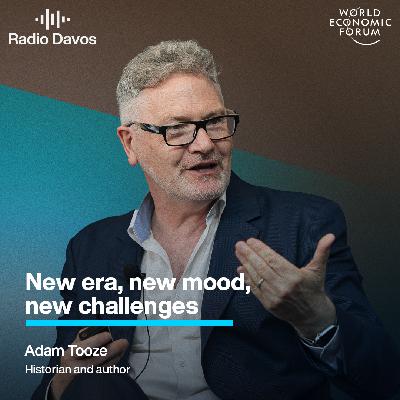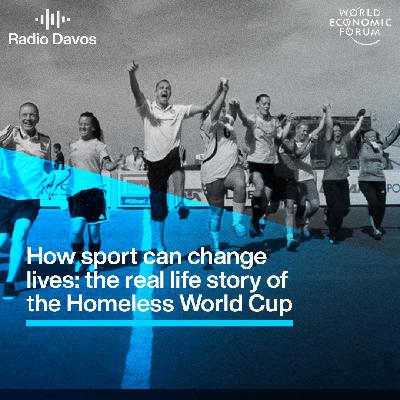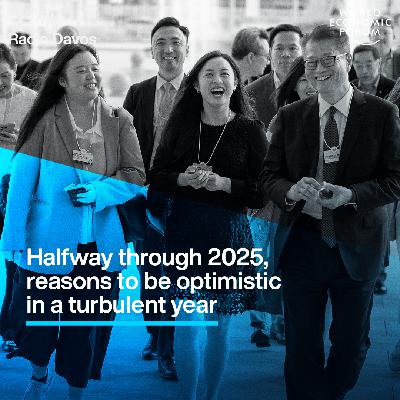Discover Radio Davos
Radio Davos

Radio Davos
Author: World Economic Forum
Subscribed: 397Played: 8,241Subscribe
Share
Description
How do we solve the world's biggest challenges? From climate change to inequality; the rise of big tech and rapid changes in how we live and work. Radio Davos talks to the people who have the ideas, the passion and the power to make change happen in a way that benefits all of us.
281 Episodes
Reverse
Up to now, the vast majority of the world's ocean was not governed by a global treaty that would protect this vital part of the planet from pollution or over-exploitation - meaning the high seas were something of a Wild West. But that is all changing. After years of negotiations, member states of the United Nations have agreed the High Seas Treaty, ensuring the protection and sustainable use of marine biodiversity of areas beyond national jurisdictions. Almost two-thirds of the planet's surface is ocean and the seas make up 95% of the Earth's total habitat by volume. But, only 1% of the high seas has, up until now, been under any protection protocol and just 39% of the ocean falls under the national jurisdiction of individual countries. Kristian Teleki, Director of Ocean Action Agenda and Friends of Ocean Action at the World Economic Forum tells us what is in the treaty and why it's such a big deal for the planet. Find out more: Friends of Ocean Action Further listening: Subscribe on any platform: https://pod.link/1504682164 Join the World Economic Forum Podcast Club Get all our podcasts at wef.ch/podcasts. Radio Davos Agenda Dialogues Meet the Leader The World Economic Forum Book Club Podcast
"During those 102 hours, I connected with my soul, my brain, my body, to a level that I will probably never do again. And I discovered a part of myself that I couldn't think was capable of doing what I did." Noam Yaron swam from Corsica to just off the coast of Monaco, mainland Europe, to push himself to the limit and raise awareness about the marine environment. Here's what he learned about human endurance and the threats to nature posed by pollution, shipping and rising temperatures. Links: Friends of Ocean Action: https://www.weforum.org/friends-of-ocean-action/ The 30X30 Ocean Action Plan to protect 30% of the ocean by 2030: https://reports.weforum.org/docs/WEF_30x30_Ocean_Action_Plan_2025.pdf Water Lover Challenge: https://www.waterlover.org/ Related podcasts: Ocean: how David Attenborough's new film will transform how you see Earth: https://www.weforum.org/podcasts/radio-davos/episodes/ocean-david-attenborough-colin-butfield/ Humans rely on the ocean. Here's how both can thrive: https://www.weforum.org/podcasts/radio-davos/episodes/ocean-marine-prosperity-areas/ Talks on creating a "Paris Treaty for plastics" just stalled - here's why, and what happens next: https://www.weforum.org/podcasts/radio-davos/episodes/plastics-treaty-inc-gpap/ Check out all our podcasts on wef.ch/podcasts: YouTube: https://www.youtube.com/@wef Radio Davos - subscribe: https://pod.link/1504682164 Meet the Leader - subscribe: https://pod.link/1534915560 Agenda Dialogues - subscribe: https://pod.link/1574956552 Join the World Economic Forum Podcast Club: https://www.facebook.com/groups/wefpodcastclub
Can farming be productive and profitable but without damaging nature and adding to greenhouse gases? As COP30 begins in Belém, Brazil, we hear from a Brazilian entrepreneur involved in regenerative agriculture in Brazil, in a podcast co-hosted with the World Economic Forum's Tropical Forest Alliance. Hosts: Robin Pomeroy, host, Radio Davos Danielle Carreira, Head of Finance, Tropical Forest Alliance Guest: Luis Fernando Laranja da Fonseca, CEO, Grupo Caapora Links: Tropical Forest Alliance: https://www.tropicalforestalliance.org/home Innovative Finance for the Amazon, Cerrado and Chaco (IFACC): www.ifacc-initiative.org Grupo Caapora: https://grupocaapora.com.br/ Related blogs: COP30 in Brazil: What is at stake: https://www.weforum.org/stories/2025/11/what-is-cop30-what-is-at-stake-climate-nature-action/ Ahead of COP30, a new era of forest restoration and resilience is taking root: https://www.weforum.org/stories/2025/11/cop30-new-era-of-forest-restoration-and-resilience/ Related podcasts: Why our future must be 'nature positive': https://www.weforum.org/podcasts/radio-davos/episodes/nature-positive-marco-lambertini/ Humans rely on the ocean. Here's how both can thrive: https://www.weforum.org/podcasts/radio-davos/episodes/ocean-marine-prosperity-areas/ Check out all our podcasts on wef.ch/podcasts: YouTube: - https://www.youtube.com/@wef/podcasts Radio Davos - subscribe: https://pod.link/1504682164 Meet the Leader - subscribe: https://pod.link/1534915560 Agenda Dialogues - subscribe: https://pod.link/1574956552 Join the World Economic Forum Podcast Club: https://www.facebook.com/groups/wefpodcastclub
Governments in the global North have slashed aid budgets at a time when humanitarian needs have reached record levels, forcing a rethink on global aid and development. In this podcast, co-hosted by humanitarian news agency Devex, we look at where things may go from here and what new models of cooperation might offer hope. Hosts: Robin Pomeroy, Radio Davos, World Economic Forum Raj Kumar, This Week in Global Development, Devex Guests: Carla Haddad Mardini, Director, Private Fundraising and Partnerships Division, United Nations Children's Fund (UNICEF) Julienne Oyler, CEO, Inkomoko Links: Humanitarian and Resilience Investing Initiative: https://initiatives.weforum.org/humanitarian-and-resilience-investing-initiative Schwab Foundation for Social Entrepreneurship: www.schwabfound.org - look out for forthcoming report, Social Enterprise in Africa. UNICEF: https://www.unicef.org/ Inkomoko: https://www.inkomoko.com/ Devex: https://www.devex.com/ Related podcasts: This Week in Global Development: https://www.devex.com/news/this-week-in-global-development-106893 Superpower rivalry and geopolitics in Trump 2.0: https://wef.ch/4oOOsys We have entered the age of "persistent disruption" - Visa's Wayne Best on the Chief Economists Outlook: http://wef.ch/4puuU3m What you might get wrong about progress - Lessons for leaders: Harvard psychologist Steven Pinker: https://www.weforum.org/podcasts/meet-the-leader/episodes/steven-pinker-harvard-humanity-doing-better/ Check out all our podcasts on wef.ch/podcasts: YouTube: - https://www.youtube.com/@wef/podcasts Radio Davos - subscribe: https://pod.link/1504682164 Meet the Leader - subscribe: https://pod.link/1534915560 Agenda Dialogues - subscribe: https://pod.link/1574956552 Join the World Economic Forum Podcast Club: https://www.facebook.com/groups/wefpodcastclub
How does the superpower rivalry between the US and China dictate international relations more broadly? And what does it mean for the future of trade, security and development? Lyunn Kuok, Lee Kuan Yew, Chair in Southeast Asia Studies at the Brookings Institution, and a member of the Forum's Global Future Council on Geopolitics, analyses the state of the global relations almost a year into the second Donald Trump presidency. This episode is a collaboration between the World Economic Forum's weekly Radio Davos and Beyond the Headlines, the flagship current affairs podcast of The National, the Middle East's leading English-language newspaper. It was recorded at the Forum's Annual Meetings of the Global Future Councils and Cybersecurity in Dubai on 15 October, 2025. It is co-hosted by Mina Al-Oraibi, The National's Editor-in-Chief. Watch a video version of this podcast on our YouTube channel: https://wef.ch/43bySEO Links: Network of Global Future Councils: https://initiatives.weforum.org/global-future-council Global Future Council on Geopolitics: https://initiatives.weforum.org/global-future-council-on-geopolitics Annual Meetings of the Global Future Councils and Cybersecurity 2025: https://www.weforum.org/meetings/annual-meetings-of-the-global-future-councils-and-cybersecurity-2025/ The National: https://www.thenationalnews.com/ Related podcasts: Beyond the Headlines podcast: https://www.thenationalnews.com/podcasts/beyond-the-headlines/ Related Radio Davos episodes: We have entered the age of "persistent disruption" - Visa's Wayne Best on the Chief Economists Outlook: https://www.weforum.org/podcasts/radio-davos/episodes/chief-economists-outlook-visa-wayne-best/ "New era, new mood, new challenges" - historian Adam Tooze on why things will never be the same again: https://www.weforum.org/podcasts/radio-davos/episodes/adam-tooze-cnbc-china-us-history/ Check out all World Economic Forum podcasts on wef.ch/podcasts: YouTube: - https://www.youtube.com/@wef/podcasts Radio Davos - subscribe: https://pod.link/1504682164 Meet the Leader - subscribe: https://pod.link/1534915560 Agenda Dialogues - subscribe: https://pod.link/1574956552 Join the World Economic Forum Podcast Club: https://www.facebook.com/groups/wefpodcastclub
We all rely on nature to survive - but humans continue to destroy and degrade the environment to an extent that puts our own species at risk Nature conservationist Marco Lambertini puts the case for going 'nature positive' - getting companies and countries to account for their impact on nature and find ways to conserve and restore more than they destroy. Links: Nature Positive Initiative: https://www.naturepositive.org/ World Economic Forum's New Nature Economy reports: https://www.weforum.org/publications/series/new-nature-economy/ World Economic Forum's Bioeconomic Initiative: https://initiatives.weforum.org/bioeconomy-initiative/home Alliance of CEO Climate Leaders: https://initiatives.weforum.org/alliance-of-ceo-climate-leaders Alliance of CEOs for Nature: https://initiatives.weforum.org/ceo-alliance/home Related podcasts: "All of this is teamwork" - how 'industrial clusters' are accelerating the energy transition: http://wef.ch/4h0W7aa Are we on track for the energy transition? Insights from three CEOs: http://wef.ch/4nyDxIZ Ocean: how David Attenborough's new film will transform how you see Earth: http://wef.ch/4729DHk Check out all our podcasts on wef.ch/podcasts: YouTube: - https://www.youtube.com/@wef/podcasts Radio Davos - subscribe: https://pod.link/1504682164 Meet the Leader - subscribe: https://pod.link/1534915560 Agenda Dialogues - subscribe: https://pod.link/1574956552 Join the World Economic Forum Podcast Club: https://www.facebook.com/groups/wefpodcastclub
The transition to net-zero is a daunting challenge for any industry - but what if diverse sectors can help each other speed up progress? That's what can happen in an 'industrial cluster'. In the episode we hear from two such clusters - the Port of Antwerp-Bruges in Belgium and the Andalusia Green Hydrogen Valley in Spain - just two of the more than 35 industrial clusters around the world, supported by the World Economic Forum's Transitioning Industrial Clusters (TIC) initiative, to drive economic growth, employment and cut greenhouse gas emissions. And we speak to the head of the Mission Possible Partnership - an organisation that works to advance the energy transition in industry which also puts a strong emphasis on industry clusters or 'clean industrial hubs'. Episode page with transcript: http://wef.ch/46rZO3T Links: Transitioning Industrial Clusters: https://initiatives.weforum.org/transitioning-industrial-clusters/home Mission Possible Partnership: https://www.missionpossiblepartnership.org/ Port of Antwerp-Bruges: https://www.portofantwerpbruges.com/en Andalusia Green Hydrogen Valley: https://www.moeveglobal.com/en/businesses/commercial-clean-energies/green-hydrogen/andalusian-valley Related podcasts: How to nudge heavy industry to sustainability: the First Movers Coalition: https://www.weforum.org/podcasts/radio-davos/episodes/fmc-concrete-cement/ Can aviation ever be sustainable? Here are some paths to net zero: https://www.weforum.org/podcasts/radio-davos/episodes/aviation-day-airports-sustainable-fuel-saf/ Climate science is clearer than ever. How should companies respond?: https://www.weforum.org/podcasts/radio-davos/episodes/climate-science-policy-business-response/ Check out all our podcasts on wef.ch/podcasts: YouTube: https://www.youtube.com/@wef Radio Davos - subscribe: https://pod.link/1504682164 Meet the Leader - subscribe: https://pod.link/1534915560 Agenda Dialogues - subscribe: https://pod.link/1574956552 Join the World Economic Forum Podcast Club: https://www.facebook.com/groups/wefpodcastclub
One of the main things needed to achieve net zero that is to transform how we produce and consume energy. In this podcast, CEOs of three very different companies on the front lines of the energy transition around the world assess where the energy transition is now, and what the future may look like. Speakers: Christian Bruch, CEO, Siemens Energy Andrés Gluski, CEO, AES Corporation Lei Zhang, CEO, Envision Group Co-host: Charles Bourgault manager, electricity industry, World Economic Forum Episode page with transcript: https://www.weforum.org/podcasts/radio-davos/episodes/energy-transition-electrification-siemens-aes-envision Related podcasts: Climate science is clearer than ever. How should companies respond? Getting sustainable, secure and equitable power to the people - how's the global energy transition going? Energy Transition: Amping Up or Powering Down? All Hands on Deck for the Energy Transition Check out all our podcasts on wef.ch/podcasts: YouTube: - https://www.youtube.com/@wef/podcasts Radio Davos - subscribe: https://pod.link/1504682164 Meet the Leader - subscribe: https://pod.link/1534915560 Agenda Dialogues - subscribe: https://pod.link/1574956552 Join the World Economic Forum Podcast Club: https://www.facebook.com/groups/wefpodcastclub
Electronic devices that tap into a human's nervous system have been around for decades, for example to help paralysed people move and deaf people hear. Now, a new generation of neurotechnology promises to revolutionise treatments for a range of conditions that afflict billions of people. We look at the benefits and assess the risks with Jen French, a campaigner for access to neurotechnlolgy who has been using a device for 25 years since a snowboarding accident made her quadriplegic. And Tom Oxley, the CEO of neurotech startup Synchron, explains how 'brain computer interfaces' are giving paralysed patients the ability to use computers and smart phones. They also address concerns about things such as data privacy, unequal access to health tech, and device 'abandonment'. Episode page with transcript: http://wef.ch/46Tt4Rm Watch the video version here: https://youtu.be/KmIMQVUdHBc Links: Network of Global Future Councils: https://initiatives.weforum.org/global-future-council/ Related podcasts: 'We have the most to benefit, but also the most to lose': how AI could transform human health: Check out all our podcasts on wef.ch/podcasts: YouTube: https://www.youtube.com/@wef Radio Davos - subscribe: https://pod.link/1504682164 Meet the Leader - subscribe: https://pod.link/1534915560 Agenda Dialogues - subscribe: https://pod.link/1574956552
The global economy is moving from experiencing "episodic shocks" to "a new operating regime, one that is defined now by persistent disruption." So says Wayne Best, chief economist at Visa, as he gives his take on the Chief Economists Outlook, the World Economic Forum's regular pulse check of the world economy and where it is headed. Episode page with transcript: https://www.weforum.org/podcasts/radio-davos/episodes/chief-economists-outlook-visa-wayne-best Links: Chief Economists Outlook: wef.ch/chiefeconsept25 Related podcasts: "New era, new mood, new challenges" - historian Adam Tooze on why things will never be the same again "Trillions of dollars added to the economy" - Google's chief economist on the macro impact of AI The global economy 'at a crossroads' ahead of Davos: Chief Economists Outlook Check out all our podcasts on wef.ch/podcasts: YouTube: https://www.youtube.com/@wef Radio Davos - subscribe: https://pod.link/1504682164 Meet the Leader - subscribe: https://pod.link/1534915560 Agenda Dialogues - subscribe: https://pod.link/1574956552 Join the World Economic Forum Podcast Club: https://www.facebook.com/groups/wefpodcastclub
How can you keep up with the rapidly changing skills needed in a job market being transformed by artificial intelligence? Kian Katanforoosh, founder of tech startup Workera, has advice for all of us on how to ensure we are 'AI-ready'. Episode page with transcript: https://www.weforum.org/podcasts/radio-davos/episodes/ai-skills-workera-kian-katanforoosh Related podcasts: Stock markets and supermarkets: how business is deploying AI: https://www.weforum.org/podcasts/radio-davos/episodes/ai-financial-services-consumer-goods-industries/ Beyond the hype, how industries are deploying AI at the heart of their operations: https://www.weforum.org/podcasts/radio-davos/episodes/ai-industries-in-the-intelligent-age/ Check out all our podcasts on wef.ch/podcasts: YouTube: https://www.youtube.com/@wef Radio Davos - subscribe: https://pod.link/1504682164 Meet the Leader - subscribe: https://pod.link/1534915560 Agenda Dialogues - subscribe: https://pod.link/1574956552 Join the World Economic Forum Podcast Club: https://www.facebook.com/groups/wefpodcastclub
Around the world, people are developing low-emissions technologies - but they can only succeed if there is market demand. In this episode, we hear how the First Movers Coalition helps create that market by getting big companies to invest in emerging technologies that aim to de-carbonise the 'hard to abate' sectors. And we meet the buyer and seller of low-emissions cement doing just that. Speakers: Noam Boussidan, Programme Head, First Movers Coalition Julia Fidler, Head of Materials and Fuels Decarbonisation, Microsoft Joe Hicken, Senior Vice President of Business Development and Policy, Sublime Systems Links: First Movers Coalition: https://initiatives.weforum.org/first-movers-coalition/home Check out all our podcasts on wef.ch/podcasts: YouTube: https://www.youtube.com/@wef Radio Davos - subscribe: https://pod.link/1504682164 Meet the Leader - subscribe: https://pod.link/1534915560 Agenda Dialogues - subscribe: https://pod.link/1574956552 Join the World Economic Forum Podcast Club: https://www.facebook.com/groups/wefpodcastclub
The European Union is implementing a 'Carbon Border Adjustment Mechanism' (CBAM) that will levy a fee on importing certain goods that are produced in countries that lack regulations forcing producers to cut their greenhouse gas emissions. It's an idea that other countries are considering, but is also hugely complex and may be challenged by exporter countries. Two expert guests explain the policy and its implications for business and global trade. Speakers: Aaron Cosbey, Senior Associate, International Institute for Sustainable Development (IISD) Dandy Rafitrandi, researcher at the Department of Economics, Centre for Strategic and International Studies (CSIS), Indonesia Kimberley Botwright, Head, Sustainable Trade, World Economic Forum (co-host) Links: World Economic Forum Centre for Regions, Trade and Geopolitics: https://centres.weforum.org/centre-for-regions-trade-and-geopolitics/home Emissions in trade: Where are they and how do we measure them?: https://www.weforum.org/stories/2025/03/emissions-in-trade-how-we-measure-them/ CBAM: What you need to know about the new EU decarbonization incentive: https://www.weforum.org/stories/2022/12/cbam-the-new-eu-decarbonization-incentive-and-what-you-need-to-know/ What future for climate and trade? Scenarios and strategies for carbon competitiveness?: https://www.weforum.org/publications/what-future-for-climate-and-trade-scenarios-and-strategies-for-carbon-competitiveness/ Countries must deal with imported emissions in a fair and flexible way: https://www.climatechangenews.com/2025/08/27/countries-must-deal-with-imported-emissions-in-a-fair-and-flexible-way/ European Commission on CBAM: https://trade.ec.europa.eu/access-to-markets/en/news/carbon-border-adjustment-mechanism-cbam International Institute for Sustainable Development: https://www.iisd.org/ Centre for Strategic and International Studies: https://www.csis.or.id/ Podcasts: Climate science is clearer than ever. How should companies respond?: https://www.weforum.org/podcasts/radio-davos/episodes/climate-science-policy-business-response/ It was 'no deal' on a global plastics treaty - so what happens now?: https://www.weforum.org/podcasts/radio-davos/episodes/plastics-treaty-inc5-gpap/ Tariffs, globalization, and democracy, with Harvard economist Dani Rodrik: https://www.weforum.org/podcasts/radio-davos/episodes/dani-rodrik-economics-globalization-tariffs/ The global economy 'at a crossroads' ahead of Davos: Chief Economists Outlook: https://www.weforum.org/podcasts/radio-davos/episodes/chief-economists-outlook-ralph-ossa-wto/ Check out all our podcasts on wef.ch/podcasts: YouTube: https://www.youtube.com/@wef Radio Davos - subscribe: https://pod.link/1504682164 Meet the Leader - subscribe: https://pod.link/1534915560 Agenda Dialogues - subscribe: https://pod.link/1574956552 Join the World Economic Forum Podcast Club: https://www.facebook.com/groups/wefpodcastclub
Welcome to this bonus episode of Radio Davos. A few episodes ago we interviewed author and historian Adam Tooze about geopolitics. Adam has his own podcast, Ones & Tooze, published by Foreign Policy where he is also a columnist. We thought we would pop an episode on the Radio Davos feed so you can take a listen. In this episode, Adam and his co-host Foreign Policy deputy editor Cameron Abadi, look at the state of global development. Radio Davos will be back very soon, in the meantime enjoy this episode of Ones and Tooze. Ones and Tooze show notes: Whither Global Development Some 10 years ago, the United Nations came up with its Sustainable Development Goals, a series of objectives for the world around alleviating poverty and protecting the planet. But these days, it's clear that very few of those goals will be met by the target date of 2030. What happened? And what does the Trump administration's retreat from international development mean for the world? On this episode of Ones and Tooze, a weekly economics podcast from Foreign Policy magazine, hosts Adam Tooze and Cameron Abadi dig in. New episodes of Ones and Tooze are released every Friday. Follow the show on Apple, Spotify, or wherever you listen. https://podcasts.apple.com/us/podcast/ones-and-tooze/id1584397047 https://open.spotify.com/show/44pekawcpIJ7KgwcFIgZDr https://foreignpolicy.com/podcasts/ones-and-tooze/ World Economic Forum podcasts: Check out all our podcasts on wef.ch/podcasts: YouTube: https://www.youtube.com/@wef Radio Davos - subscribe: https://pod.link/1504682164 Meet the Leader - subscribe: https://pod.link/1534915560 Agenda Dialogues - subscribe: https://pod.link/1574956552 Join the World Economic Forum Podcast Club: https://www.facebook.com/groups/wefpodcastclub
The politics might change, but the science is clearer than ever. The planet is warming - and even faster than predicted - due to the emission of greenhouse gases. Faced with the facts, where do businesses, policymakers, and the rest of us go from here? We get the latest in climate science from Johan Rockström, director of the Potsdam Institute for Climate Impact Research, and hear from Sumant Sinha, the head of India-based renewable energy company ReNew, on the outlook for business. The episode is co-hosted by Pim Valdre, head of the World Economic Forum's Climate Ambition Initiative and leader of the Alliance of CEO Climate Leaders. To watch the video-podcast, head to: https://www.youtube.com/@wef/podcasts Links: Alliance of CEO Climate Leaders: https://initiatives.weforum.org/alliance-of-ceo-climate-leaders/ Potsdam Institute for Climate Impact Research: https://www.pik-potsdam.de/en/home ReNew: https://www.renew.com/ Related podcasts: Can climate action survive geopolitical upheaval? Humans rely on the ocean. Here's how both can thrive Breathe! The cities working together on air pollution and climate change Check out all our podcasts on wef.ch/podcasts: YouTube: - https://www.youtube.com/@wef/podcasts Radio Davos - subscribe: https://pod.link/1504682164 Meet the Leader - subscribe: https://pod.link/1534915560 Agenda Dialogues - subscribe: https://pod.link/1574956552 Join the World Economic Forum Podcast Club: https://www.facebook.com/groups/wefpodcastclub
A second - and supposedly final - last round of talks to agree a global treaty to tackle plastics pollution this month ended with no deal. Clemence Schmid, director of the Global Plastics Action Partnership, tells us what happened and what might happen next. Links: Global Plastic Action Partnership: https://www.globalplasticaction.org/ Watch the World Economic Forum's documentary, "Invisible Warriors: The force behind Viet Nam's plastic action": https://www.weforum.org/videos/invisible-warriors-the-force-behind-viet-nam-s-plastic-action/ Check out all our podcasts on wef.ch/podcasts: YouTube: - https://www.youtube.com/@wef/podcasts Radio Davos - subscribe: https://pod.link/1504682164 Meet the Leader - subscribe: https://pod.link/1534915560 Agenda Dialogues - subscribe: https://pod.link/1574956552 Join the World Economic Forum Podcast Club: https://www.facebook.com/groups/wefpodcastclub
The weekly podcast from the World Economic Forum that looks at the biggest challenges and how we might solve them is taking a summer break. We'll be back in late August, but in the meantime check out the Radio Davos back catalogue - well over 200 episodes from the last five years, as well as our sister podcasts, Meet the Leader and Agenda Dialogues. You can find all of them wherever you listen to podcasts - including YouTube where an increasing number of episodes are full video-podcasts. Our webpage, with transcripts for most episodes, is wef.ch/podcasts. Please follow us on your favourite podcast app so you don't miss an episode. Check out all our podcasts on wef.ch/podcasts: YouTube: - https://www.youtube.com/@wef/podcasts Radio Davos - subscribe: https://pod.link/1504682164 Meet the Leader - subscribe: https://pod.link/1534915560 Agenda Dialogues - subscribe: https://pod.link/1574956552 Join the World Economic Forum Podcast Club: https://www.facebook.com/groups/wefpodcastclub
Historian and podcaster Adam Tooze says we are at a turning point in history - as the Trump administration upends decades of assumptions on geopolitics, trade and the economy. Coinciding with the dawn of artificial intelligence, the rise of China, and demographic shifts are adding to transformative changes for us all. CNBC anchor Chery Kang joins us in the studio at AMNC25 to co-host the episode. This is a video-podcast, watch it on our YouTube channel: http://wef.ch/3GFeAvl Related podcasts: Halfway through 2025, reasons to be optimistic in a turbulent year Three experts on how to understand the USA Tariffs, globalization, and democracy, with Harvard economist Dani Rodrik Check out all our podcasts on wef.ch/podcasts: YouTube: https://www.youtube.com/@wef Radio Davos - subscribe: https://pod.link/1504682164 Meet the Leader - subscribe: https://pod.link/1534915560 Agenda Dialogues - subscribe: https://pod.link/1574956552
"The Beautiful Game" is a feelgood movie about a football tournament between teams of homeless people from around the world, with the upbeat message that sport can change, even save, lives. We speak to the man who created the real-life Homeless World Cup, an annual event aimed at lifting people out of homelessness. Guest: Mel Young, President of the Homeless World Cup Related podcats: The 90-year-old using sports to change the lives of refugees Check out all our podcasts on wef.ch/podcasts: YouTube: - https://www.youtube.com/@wef/podcasts Radio Davos - subscribe: https://pod.link/1504682164 Meet the Leader - subscribe: https://pod.link/1534915560 Agenda Dialogues - subscribe: https://pod.link/1574956552 Join the World Economic Forum Podcast Club: https://www.facebook.com/groups/wefpodcastclub
As we enter the second half of a turbulent 2025, we hear key lessons from the Summer Davos, AMNC25, and leaders from the World Economic Forum set out their priorities for the rest of the year where global collaboration is needed more than ever. Speakers: World Economic Forum: Sheba Crocker, head of Global Communications Group Saadia Zahidi, head of Centre for New Economy and Society Sebastian Buckup, head of Centre for Nature and Climate Mirek Dusek, responsible for the World Economic Forum summits Kiva Allgood, head of Centre for Advanced Manufacturing and Supply Chains Gim Huay Neo, head of Asia strategy Jeremy Jurgens, head of innovation and emerging technology Others: Eswar Prasad, Professor, Cornell University Adam Tooze, Director, European Institute, Columbia University Chinese Premier Li Qiang Kian Katanforoosh, Founder and Chief Executive Officer, Workera Hassan Elkhatib, Minister of Investment and Foreign Trade, Ministry of Investment and Foreign Trade of Egypt Lindsay Hooper, Chief Executive Officer, University of Cambridge Institute for Sustainability Leadership Catch up on all the action from AMNC25 at wef.ch/amnc25 and across social media using the hashtag #AMNC25. Listen to selected AMNC sessions on the Agenda Dialogues podcast. Forum reports mentioned in the podcast: Top 10 Emerging Technologies of 2025 Chief Economists Outlook Fostering Effective Energy Transition 2025 Forum initiatives mentioned in the podcast: First Movers Coalition Global Future Councils Technology Pioneers Uplink Related podcasts: What to expect from the 'Summer Davos' AMNC; and what the West gets wrong about China Tech poised to 'change the world': Top Ten Emerging Technologies 2025: https://www.weforum.org/podcasts/radio-davos/episodes/top-ten-emerging-tech-2025/ Getting sustainable, secure and equitable power to the people - how's the global energy transition going? "Trillions of dollars added to the economy" - Google's chief economist on the macro impact of AI Stock markets and supermarkets: how business is deploying AI Beyond the hype, how industries are deploying AI at the heart of their operations



